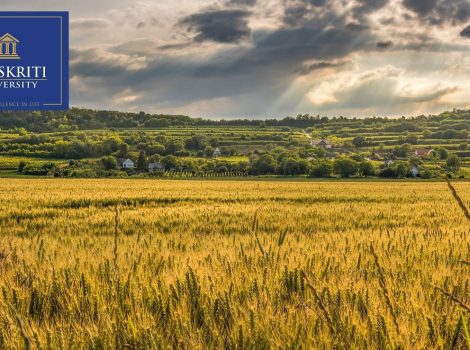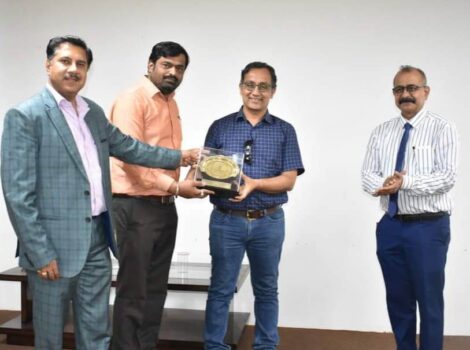Agriculture – MSME – Centre of Excellence
For decades, India has produced the bulk of its food through traditional ways of farming/ agriculture. The system is majorly dominated by large farms growing the same crops every year using enormous amounts of chemical pesticides and fertilizers. Such agrarian techniques have resulted in irreversible damage to the soil, water, air, and climate. As we all know, an aggressively-consuming system which squanders and degrades natural resources cannot last for long. In the 21st century, the farming industry faces severe challenges; the matter is exacerbated by the environmental impact.

It is often said that the past has the answer to all problems – this could not be more true in the case of Sanskriti University’s Centre of Excellence on Ecological Farming (CEEF). The Centre has taken a different path in solving contemporary and foreseeable obstacles by focusing on ancient agrarian techniques from Lord Krishna’s times. Theoretical concepts and practical training have roots in the Vedic period.
What sets the CEEF’s training program apart?
If there’s one thing we all agree on, it is that the Vedic Period was a treasure trove of knowledge. There is a wealth of information about farming in ancient times, and the Centre of Excellence on Ecological Farming at Sanskriti University has unlocked it. The institute’s training programs act as a bridge between traditional, organic farming to make a positive impact on the environment. Just like in Lord Krishna’s times, the Centre pays respect to Nature and aims to heal its deteriorating condition.
The Centre’s operations are guided by the Process and Products Development Center (PPDC), Ministry of Micro, Small and Medium Enterprises of Agra Region. Currently, it implements the best farming practices in Agra and Mathura region. It puts a spotlight on nature-friendly farming that gives the maximum yield that is not just of high quality but sustainable too.
Sanskriti’s Centre of Excellence imparts quality, certified training that includes teaching a farming system that is more sustainable—environmentally, economically, and socially. The result-oriented curriculum focuses on agriculture techniques that do not place any significant pressure on natural resources and the environment. The grains and fodder produced also do not impact living organisms and preserve & promote biodiversity. The faculty teaches agricultural methods and systems for all sizes, producing a diverse range of foods, fibers, and fuels as well as adapting to local conditions and regional markets. Emphasis is laid on state-of-the-art, science-based practices that maximize productivity and profit while minimizing environmental damage.
All in all, the overall aim of CEEF’s curriculum is to use quality training to break down the complexities of agricultural sustainability into easily manageable facets.
Who can benefit from the Centre of Excellence?
Local students, foreign researchers and farmers from all over the country can enroll at the University’s Centre of Excellence on Ecological Farming (CEEF). From state-of-the-art infrastructure, erudite faculty, rigorous training, as well as apparatus for research, the Centre has everything required for you to take the plunge. What’s more, the training seminars and workshops are addressed by experienced experts from various agricultural universities and MSMEs panel of experts.
Students of Engineering, Agriculture and allied Sciences can benefit from this program as it will give them a new perspective towards agriculture and the deteriorating condition of Mother Nature. That being said, the organization’s doors are open to any talented young mind who wish to make the world a better place through farming.
From an entrepreneurial point of view, a farm with sustainable growth is a profitable business that contributes to a robust economy and deals fairly with its workers and has a mutually beneficial relationship with the surrounding community. From a scientific perspective, working with Nature rather than against it makes more sense. Farmers who manage their land using agro-ecological principles can learn to control tackling damaging impacts without sacrificing productivity or profitability. The social implication of sustainable agriculture is an enhanced quality of life for farm families and communities.
Accordingly, the curriculum strives to nurture the minds of young entrepreneurs, industry leaders, farmers, engineers and scientists who have good stewardship of agricultural systems and natural resources that farms rely on.
If you’re interested in enrolling for a training program, call 1800-120-2880.



